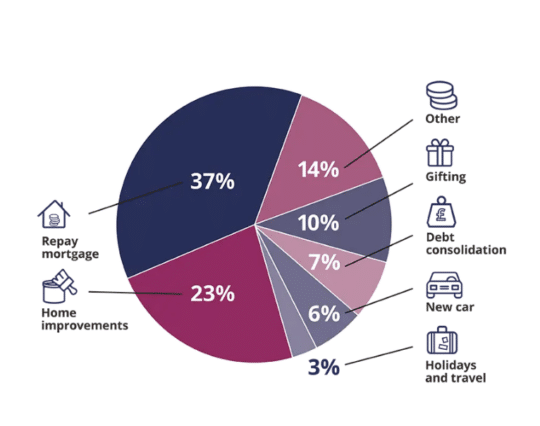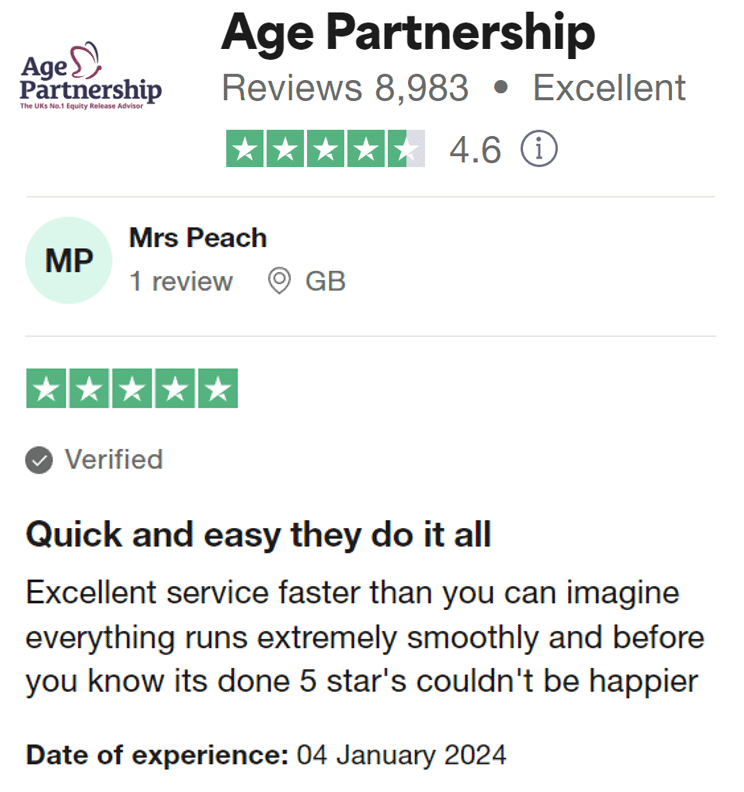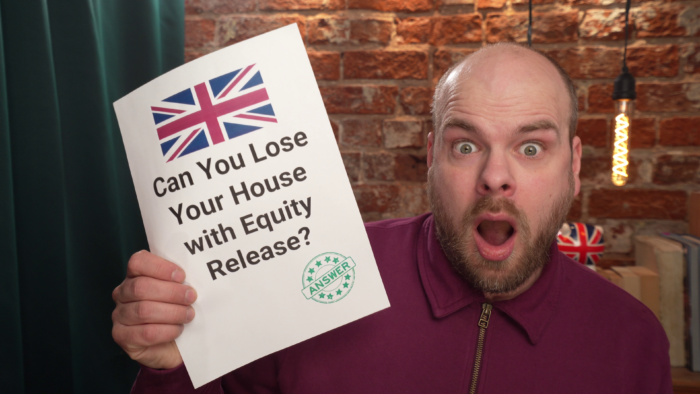Best Way to Release Equity from Your House – Complete Guide
Our preferred equity release adviser is Age Partnership. For free and impartial money advice you can visit MoneyHelper.

Our preferred equity release adviser is Age Partnership. For free and impartial money advice you can visit MoneyHelper.
Are you looking to find out how to release money from your house in the UK? You’ve come to the right place. Each month, over 7,000 people visit our website to learn about equity release.
In this article, we will explain:
- What home equity is and how it’s at risk.
- Various ways to release equity from your house.
- The purpose of equity release and how to get a realistic quote.
- The pros and cons of equity release.
- The steps to release equity from your house.
We know that the process of releasing equity can be puzzling, but rest assured that we’re here to help you understand things better. With our clear and straightforward advice, you’ll grasp the concept of equity release in no time.
Let’s dive in and discuss the best way for you to release equity from your house.
What is home equity?
Home equity is a term that refers to the value of your home you own outright with no outstanding debts. So, as you pay off the mortgage you took out to buy your property, your home equity will increase as long as the value of your home doesn’t decrease.
For example, if you bought a £200,000 property with a £50,000 deposit and £150,000 mortgage, your initial home equity is £50,000. If you pay off another £50,000 through years of mortgage repayments and the value of your home increases by £10,000 over the same period, you’ll have a £210,000 home with a £100,000 outstanding mortgage. Thus, you’ll have £110,000 home equity.
What is the purpose of equity release?
There are lots of reasons why people release equity from their home, and the lump sum or drawdown you receive doesn’t come with any restrictions on what it can be used for.
One of the most common reasons to release equity is to complete home improvements and renovations. Not only can this improve your standard of living, but updating the home can increase the value of your property, which increases some of your home equity once again.
Other common reasons for releasing equity are:
- Debt consolidation
- Buying second (holiday) homes
- Pay for education or private healthcare
- To buy a car
- To start a new business
Can you release equity from your home?
It is possible to access some of your home equity as a lump sum payment or drawdown facility, which will need to be paid back with interest. There are different ways of accessing this money depending on your age and personal finances.
We’ll discuss some of the best ways to release equity from your house below.
How do I release equity from my house?
There are three main ways to access your home equity in the UK:
- Equity release schemes
- Second charge mortgages (home equity loans etc.)
- Remortgaging to release equity
How equity release could help
More than 2 million people have used Age Partnership to release equity since 2004.
How your money is up to you, but here’s what their customers do…
Find out how much equity you could release by clicking the button below.
In partnership with Age Partnership.
Is it a good idea to release equity from your house?
Releasing equity from your home can be an effective way of accessing a larger amount of credit than an unsecured personal loan. If you need a decent interest rate on a larger amount, equity release can be a good idea. However, whether or not it is a good idea for you will be decided on a number of personal factors. You may want to get independent financial advice first.
If you do decide to release equity through a loan, mortgage or equity release scheme, you should only consider products from a lender that is authorised and regulated by the Financial Conduct Authority.
What are the pitfalls of equity release?
The biggest pitfall of releasing equity is not fully understanding the features and risks of the method you choose. For example, not repaying some products as agreed can result in your home being repossessed and sold to clear the debt.
Another potential pitfall is unnecessarily overborrowing against your equity. Borrowing more against your home can be costly over time and it will then take longer to pay off the debt and own your property outright.
We discuss the ways to release equity in detail below to help you with decision-making.
#1: Equity release schemes
Equity release plans are exclusively for senior homeowners. It allows them to access some of their home equity and not have to make any monthly repayments or interest repayments at all. The debt is instead paid back through the sale of their property, either when they move into aged care or after death.
To be eligible for an equity release plan, you usually need to be at least 55 years old with no existing mortgage. And your home must meet a minimum value of around £75,000.
What are the different types of equity release?
There are two main types of equity release for seniors, namely a lifetime mortgage or home reversion scheme. There’s also an enhanced lifetime mortgage which is the same as a lifetime mortgage but preferable to people with lesser life expectancy due to medical issues.
It’s better to choose a lender that is a member of the Equity Release Council, as this offers homeowners more guarantees and protection.
Lifetime mortgage
A lifetime mortgage is the most common equity release method for seniors in the UK. It allows them to access an amount of equity, typically capped around 60%. This lump sum is a loan and is charged with a fixed interest rate. The homeowner does not need to pay back the principal loan amount or the interest through monthly payments. The interest accumulates and adds to the total debt, which is then repaid from the sale of the property in the future.
Some people decide to make voluntary interest payments to reduce the debt owed. Having a lifetime mortgage for around one decade on a standard rate can double the amount owed.
You continue to live in your home as normal and can never be forced out. If the debt grows bigger than the value of the home, which is possible if you have the lifetime mortgage for 15+ years, you will be in a situation where the property sale proceeds will not cover the amount owed.
However, ERC members commit to a negative equity guarantee, which means you’ll never owe more than what the property is sold for. Your estate beneficiaries will never have to cover the debt.
Enhanced lifetime mortgage
These mortgages work the same as described above but allow people with a shorter life expectancy to access more of their equity than usual, which can help pay for private care and health services. The application process includes a medical questionnaire and applicants have the option of supplying medical records to support any claims.
Home reversion schemes
Home reversion schemes are different and less common. They don’t charge any interest but ask the homeowner to give up a greater percentage of their home’s eventual sale proceeds compared to the amount of equity they release.
For example, you may release 20% equity of your £200,000 home (£40,000) but be asked to pay back 60% of its eventual sale value. Let’s imagine house prices increase by 10% until the home needs to be sold, you would end up paying back £110,000.
Join thousands of others who release equity
Age Partnership have helped over 2 million people release equity from their home.

Mrs Wareham
“I am more than pleased to have taken out Equity Release with Age Partnership.”
Reviews shown are for Age Partnership. Search powered by Age Partnership.
#2: Second charge mortgages (home equity loans and HELOCs)
A second charge mortgage is an overarching term to describe different loans and products that allow you to borrow some of your home equity. These products are separate from your first charge mortgage used to buy your home, hence the name “second charge”. Think of them like an additional loan attached to your home.
You therefore make separate monthly repayments to your mortgage to pay off the loan and the interest rate. There are two main types of second charge mortgages called home equity loans or home equity lines of credit (HELOC).
A home equity loan is simply a loan secured by some of your home equity. The loan has a fixed interest rate and you make repayments each month. A HELOC works somewhat differently. Instead of receiving a lump sum amount, the homeowner receives a drawdown for a fixed period. During this period they only make (variable) interest repayments. And after the drawdown period, both the capital and interest must be repaid each month.
If you cannot keep up with repayments, the lender has the right to repossess and sell your home. The sale proceeds would first be used to clear the first mortgage debt before being used to clear the home equity loan or HELOC debt.
#3: Remortgaging to release equity
Remortgaging to release equity is not the same as a second charge mortgage because you don’t add a second debt to your home, but rather, extend your current mortgage by switching it.
Remortgaging is when you switch your current mortgage deal to a different deal. So, when you remortgage to release equity, you switch to a new deal but simultaneously take out a bigger mortgage by borrowing additional funds against your home equity.
For example, let’s imagine you have a £100,000 mortgage with £100,000 home equity. Instead of getting a new mortgage for £100,000, you choose to get a new £125,000 mortgage. £100,000 is used to pay off your previous mortgage, and the additional £25,000 is borrowed against your available home equity, which may be used for home renovations etc.
Second charge mortgage vs remortgage to release equity
It’s important to spot the difference between second charge mortgages and remortgaging to release equity. The former involves taking out a new and separate loan against the portion of your property that you already paid off – i.e. your equity – whereas the latter is switching your current mortgage and extending it to access some of your equity.
Is it better to remortgage to release equity?
Probably not – when you remortgage to release equity you might need to pay early repayment fees on the first mortgage, and you might need to pay other loan costs, such as mortgage advice. These can make remortgaging more expensive than taking out a separate loan.
But this is not always the case. And taking out a separate new loan may include expensive closing costs at the end of the loan term. You must factor in all the different costs and expenses of specific deals to identify the cheaper method of accessing your equity.
What is the best way to release equity from your home?
The best way to release equity from your house will be determined by age and personal circumstances.
Most senior homeowners are only going to have the option between a lifetime mortgage and a home reversion plan. Both can be exceptionally expensive methods of releasing equity and significantly decrease the value of the estate you pass on to loved ones. However, they also don’t include monthly repayments. A lifetime mortgage is more common, but a home reversion plan offers more assurances because no rolling interest is charged.
For younger homeowners, only a detailed assessment of the deals available to you is the way to know which method is better. Special attention should be paid to all the fees and costs involved.
Things to consider
Equity release will involve a home reversion or a lifetime mortgage, which is secured against your property and will reduce the value of your estate and impact funding long-term care. Our equity release partner, Age Partnership provides a personalised illustration to explain the full details. The money you release, plus the accrued interest is then repaid when you die or move into long-term care. Advice is required before proceeding with equity release and any existing mortgage must be repaid. Age Partnership provide initial advice for free and without obligation. Only if your case completes would Age Partnership’s advice fee of £1,895 be payable. Other lender and solicitor fees may apply.




